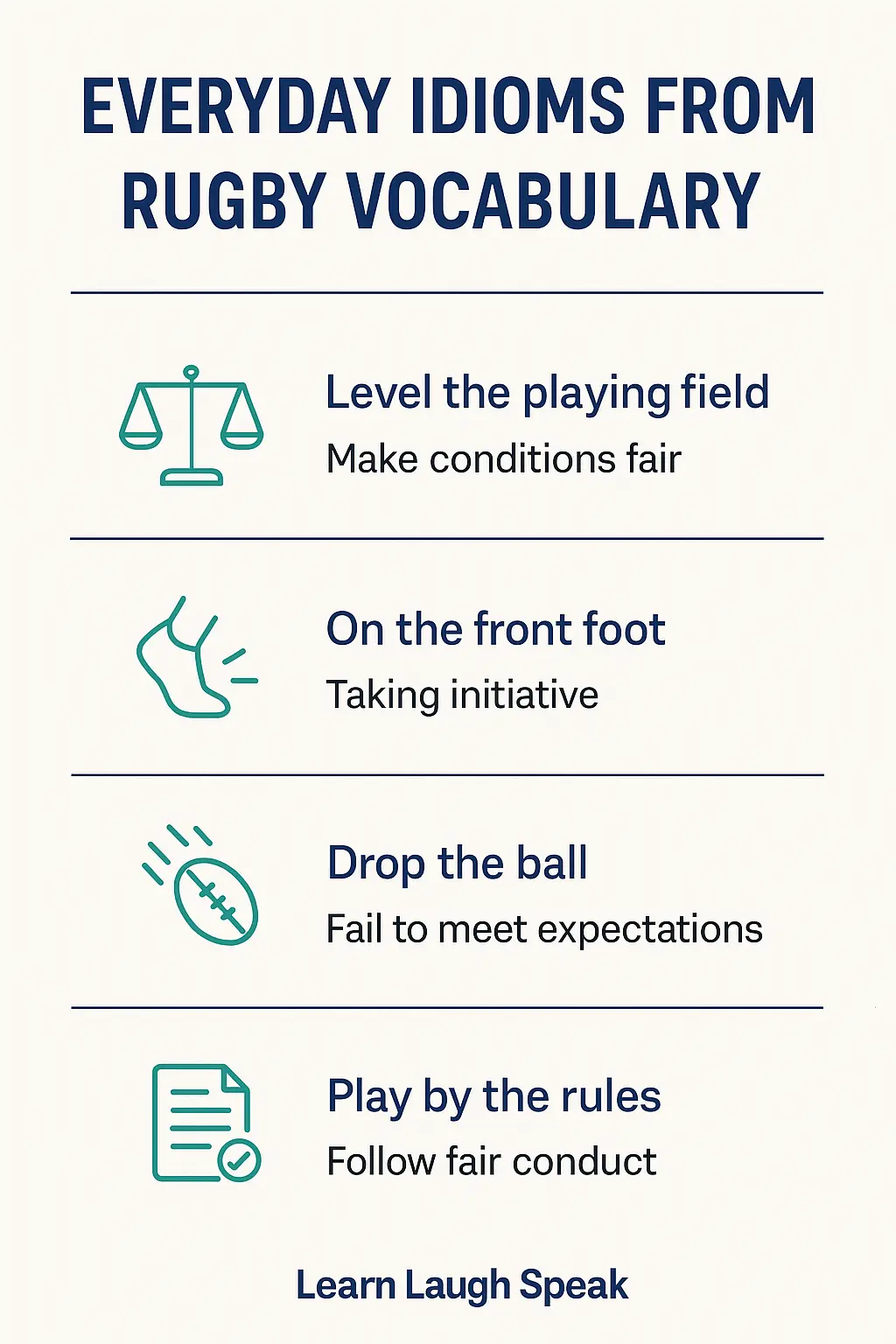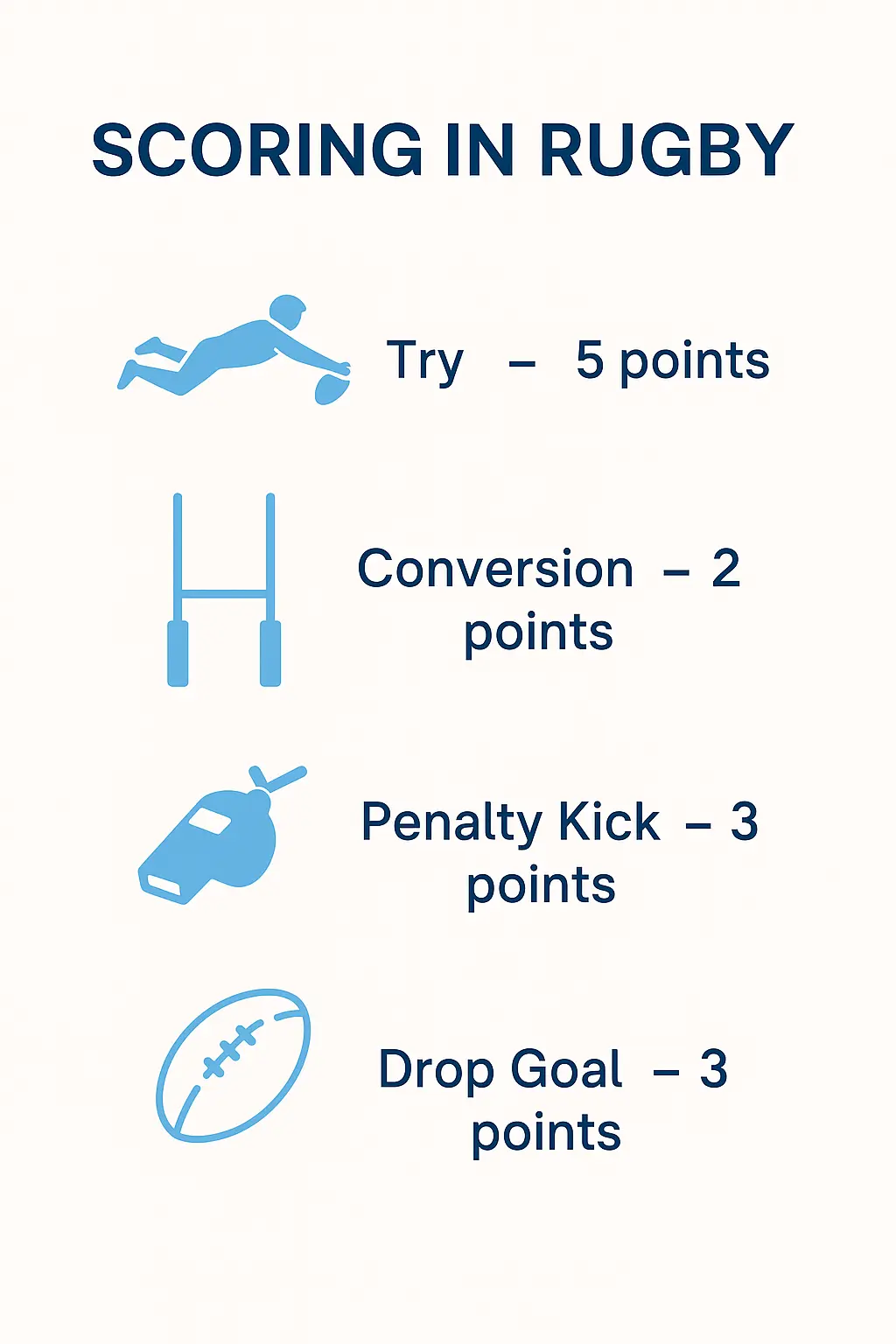Rugby is more than a sport—it’s a test of power, teamwork, and endurance. Played passionately across the UK, New Zealand, South Africa, Australia, and beyond, rugby has a language of its own. For English learners, mastering Rugby Vocabulary opens the door to understanding commentary, joining conversations, and appreciating one of the world’s toughest games.
RWC: Beginners guide to rugby jargon
Baseball Vocabulary: Understanding America’s Pastime

Why Learn this Common Games Significance?
Unlike many sports, rugby combines physical strength with complex rules. To follow a match or join a discussion, learners need to grasp the terms that describe its structure.
Learning Rugby Vocabulary helps you:
- Understand match commentary and tactical analysis.
- Follow the unique rules and scoring system.
- Recognize idioms and phrases used in everyday English.
Rugby isn’t just about tackles—it’s about communication, coordination, and culture.
Core Terms in Rugby Vocabulary
Here are the foundational words you’ll hear in every match.
- Try – The main way to score, worth five points, by grounding the ball over the opponent’s goal line.
- Conversion – A kick after a try that can add two more points.
- Scrum – A method of restarting play where forwards pack tightly together.
- Lineout – A throw-in when the ball goes out of play on the sideline.
- Ruck – When players compete for the ball on the ground after a tackle.
- Maul – When players push against each other while holding the ball off the ground.
These essentials form the backbone of Rugby Vocabulary.
Positions in Rugby Vocabulary
Each position in rugby carries distinct responsibilities. Knowing these roles helps you understand strategy and teamwork.
- Prop – Provides strength in scrums.
- Hooker – Responsible for winning the ball in scrums and lineouts.
- Lock – Tall players who support lineouts and provide power in scrums.
- Flanker – Mobile forwards who tackle and win possession.
- Scrum-Half – Links the forwards and backs, distributing the ball.
- Fly-Half – The tactical leader, often directing play with kicks and passes.
- Fullback – Defends against opposition kicks and initiates counterattacks.
Each role adds to the unique structure of Rugby Vocabulary.
Scoring System in Rugby Vocabulary
Scoring in rugby is straightforward once you learn the terms.
- Try – 5 points.
- Conversion – 2 points.
- Penalty Kick – 3 points for a successful goal after a foul.
- Drop Goal – 3 points scored by kicking the ball during open play.
These four scoring methods form a core part of Rugby Vocabulary and shape match strategies.
Rules and Tactics in Rugby Vocabulary
Rugby rules are designed to balance fair play with physical intensity.
- Knock-On – When the ball is dropped forward.
- Offside – Being ahead of the ball in open play or at a ruck.
- Advantage – Referee allows play to continue despite a foul if the non-offending team benefits.
- Penalty – Awarded for infractions, often leading to a kick at goal.
- Sin Bin (Yellow Card) – Temporary suspension of a player for dangerous play.
These phrases make Rugby Vocabulary essential for both fans and learners.

Everyday Idioms from Rugby Vocabulary
Rugby has shaped expressions used far beyond the pitch.
- “Level the playing field” – Make conditions fair.
- “On the front foot” – Taking initiative.
- “Drop the ball” – Fail to meet expectations.
- “Play by the rules” – Follow fair conduct.
Idioms like these show how Rugby Vocabulary enriches global English.
How to Practice Rugby Vocabulary
Improving your understanding of Rugby Vocabulary is easier when tied to real matches.
- Watch international games like the Rugby World Cup with English commentary.
- Read sports articles on BBC Sport or ESPN Rugby.
- Learn through role-play—practice phrases like “scrum,” “offside,” or “lineout” in conversation.
- Join online fan groups to see Rugby Vocabulary in natural use.
Active engagement ensures that the words stick, just like the game’s intensity.
Cultural Insights to Learn Here
Rugby is deeply connected to national pride and identity. Countries like New Zealand and South Africa treat it as part of their cultural fabric. Understanding isn’t just about sport—it’s about learning how English reflects teamwork, courage, and tradition.
From the haka before an All Blacks match to the roaring stadiums of South Africa, rugby’s culture is expressed through its unique language.
Your Pro Guide to Tennis Vocabulary: Serving Success
Final Thoughts
Learning Rugby Vocabulary gives learners a way to enjoy one of the world’s most challenging sports while building English fluency. Each term—try, scrum, ruck—carries both technical meaning and cultural weight.
Whether you’re following a Six Nations match, discussing strategy with friends, or applying idioms at work, these words bring clarity and confidence.
When you master Rugby Vocabulary, you gain both a sport and a language of resilience.

1 thoughts on “Rugby Vocabulary: The Language of Strength and Strategy”
Pingback: Hockey Vocabulary: Talking the Fastest Game on Ice